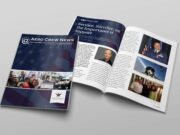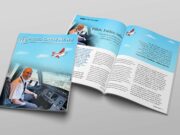How can the study of behavioral finance increase your investment returns?

Believe it or not, having a basic understanding of how our brains are wired can have a significant impact on your investment returns. Behavioral finance is an area of study focused on how psychological influences can affect market outcomes. Behavioral finance can affect market outcomes in the short term because investors make decisions based on their emotions.
We are all subject to irrational decision making. In fact, this phenomenon exists in the airplane as well as in the world of investing. There, it is called aviation psychology and applied human factors.
One of the most common examples of our behavioral biases working against us is our fight or flight response. How many times have you seen your investments decline in value and you felt the strong urge to a) make changes or b) pull all your money out of your investments to prevent further decline and/or loss? On the other hand, when an investment is experiencing high growth, our natural inclination is to purchase more of that investment or search out the investment with the highest recent returns.
I recently heard a friend say that he was going to stop investing in his 401k for a while because he was tired of watching his money disappear. I completely understand! The saying we’ve all heard during emergencies is, “Don’t just sit there, do something!” In the world of investing, sometimes it might be the complete opposite, “Don’t just do something, sit there!” That is especially challenging for type-A pilots who are used to and sometimes required to “make it happen!”
Investors often lose one fifth of their funds’ returns:
Morningstar investor-research firm recently published an article titled, “Bad Timing Cost Investors One Fifth of Their Funds’ Returns.” The study shows that due to our tendency to jump in and out of high or low performing investments we miss the opportunity to capture the returns of the very investments we own. In fact, the more complicated or “active” the investments, the lower the return the investor received, versus the fund (ETF/Mutual Fund) itself. One of the reasons for this is that investors tend to react emotionally to higher volatility investments.
Morningstar publishes an annual study called Mind the Gap: A Report on investor returns in the U.S. The emotional “gap” refers to decision making based on extreme emotions or emotional strains such as anxiety, anger, fear, or excitement. Oftentimes, emotions we confuse with rational thought are key reasons we do not make the most profitable choices with our investments.
In this year’s study, we found the average dollar invested in funds earned a 6% annual return over the 10 years ended Dec. 31, 2022, while the average fund gained about 7.7% per year over that same span, for a gap of about 1.7% annually. What this means is that investors missed out on about one fifth of their fund investments’ average net returns, a significant shortfall.
In 2020, I was repeatedly told how we should be investing in ARK Innovation ETF (ARKK) as it soared to 153% return while our boring old portfolios were just beginning to crack into low double digits. The problem is once you see the high-flying performance, it’s often too late. Intuitively, I’ve always known that this was like a nasty game of musical chairs. The last person to the party is going to get burned. As it turns out, most investors of ARKK in 2020 were the last person to the party. Take a look at the chart below and notice when the majority of investors poured their money into ARKK in 2020.
Courtesy of Morningstar.com
The circle on the bottom pane represents investment flows. This graphic clearly demonstrates that soon after investors piled their hard-earned money into ARKK in late 2020 at the highest prices, they were rewarded with subsequent annual returns of minus 23.4% and minus 67% for the years 2021 and 2022 respectively. Once your investments have declined by approximately 90% in two years, it takes 17 years to recover back to even if you average 15% returns per year.
We discussed this phenomenon in more detail on The Pilot Money Guys’ Podcast-Flight #30: Chasing Hot Stocks – Investing in the Rear View Mirror.
Common behavioral biases to be aware of
I’ve already discussed our fight or flight tendencies and their impact on our investment decisions. Here are a few other common biases that can lead to lower investment returns:
Loss Aversion:
Robert R. Johnson, professor of finance at Creighton University's Heider College of Business, argues that loss aversion can cost us money. “The biggest financial mistake people make is taking too little risk, not too much risk,” he says. Loss aversion helps explain why: Losses hurt more than gains are savored.
Overconfidence bias:
If you ask pilots if they are below average, average or above average, what would be the result? All pilots will be above average!
The problem with the overconfidence bias is that it can make an investor overestimate their abilities and knowledge, which can lead to rash or poor decisions. For example, overconfidence in investing skills can lead someone to believe they can accurately time the market (even though markets are notoriously unpredictable). Unfortunately guys, the verdict is in – because of our overconfidence, the ladies are better investors than you (and me too)!
“The tendency of women to outperform is not only seen in retail investors,” writes Dr. Daniel Crosby in his book, The Laws of Wealth. “Female hedge-fund managers have consistently and soundly thumped their male colleagues as well.”
It gets better, “… As it turns out, the mere proximity of a woman increased the dudes’ investment performance. Men in general, they reported, earned almost 1% less than women per year in their stock-picking endeavors, while single men underperformed their single women friends by 1.44% per annum!” According to a study called “Boys Will Be Boys” completed in 2001 by Barber and Odean, references the differences in investment performance by gender.
Recency bias:
From CNBC article: Recency bias is the tendency to put too much emphasis on recent events, such as a stock-market rout, the meteoric rise of bitcoin or a meme stock such as GameStop, for example.
In my experience, this is the most prevalent of all our biases. I believe it is also the reason why so many people chase after the recent, high-fund or stock performers. The recency bias makes diversification very challenging and unattractive. For example, why not just invest in the S&P 500 and call it a day? We get this question all the time and I understand why. (By the way, there are worse ways to invest.) However, if we expand our research when making the “S&P 500 Investment” decision we may see that Vanguard’s VFINX realized a cumulative return of -9.84% from January 2000 to January 2010. I remember this well as it was the exact time, I became an investor. I was too late for the glory days of the nineties when people ran retirement plans assuming an annualized 20% rate of return —conservatively! I started investing in VFINX (Vanguard S&P 500 Index Mutual Fund) in 2000 and by 2005, I couldn’t stand the losses anymore of this “terrible” S&P 500 investment. I promptly jumped out of the S&P 500 and into the energy and healthcare sectors!
What can we do to combat the negative impacts of our behavioral biases?
The mutual-fund company, The Vanguard Group, attempts to put a value on the services of an investment adviser in their study called “Advisor’s Alpha.” Although this study is very subjective, they conclude that behavior coaching “…is the greatest potential value (an advisor) can add.”
I would argue that even if you have a trusted advisor on your side, there are still many opportunities to let our emotions overrule sound decision making. So, since we all are wired for behavioral biases, what can we do about it?
The first line of defense is awareness. Without awareness, it’s like getting pummeled in a battle that you’re not even aware you're fighting. Our behavior is very predictable in the markets if we’re not taking steps to prevent emotional investment decisions.
Being intentional about your investing game plan can prevent emotional investment decisions. We encourage all investors to write down their investing plan and refer to the plan when times of market stress make us want to run for the hills.
Finally, taking the time to develop a financial plan can prevent losing out on investment returns that are readily available to patient and disciplined investors. A financial plan helps you to realize your goals, why you are investing, and what circumstances you can and cannot control.
To me it’s akin to flying in simulators. Once you’ve practiced the emergencies, referenced the checklist and discussed lessons learned, you will be much more prepared when the actual event occurs!
Sources:
- Morningstar Article: “Bad Timing Cost Investors One Fifth of Their Funds’ Returns” by Jeffery Ptak August 2, 2023.
- Vanguard Advisor’s Alpha: https://advisors.vanguard.com/advisors-alpha#overview
- The Pilot Money Guys Podcast-Flight #30: Chasing Hot Stocks – Investing in the Rear View Mirror.
- Morningstar.com: Mind the Gap: A report on investor returns in the U.S.
Leading Edge Financial Planning LLC (“LEFP”) is a registered investment advisor. Advisory services are only offered to clients or prospective clients where LEFP and its representatives are properly licensed or exempt from licensure. For additional information, please visit our website at www.leadingedgeplanning.com.
The information provided is for educational and informational purposes only and does not constitute investment advice and it should not be relied on as such. It should not be considered a solicitation to buy or an offer to sell a security. It does not take into account any investor's particular investment objectives, strategies, tax status or investment horizon. You should consult your attorney or tax advisor.
The views expressed in this commentary are subject to change based on market and other conditions. These documents may contain certain statements that may be deemed forward-looking statements. Please note that any such statements are not guarantees of any future performance and actual results or developments may differ materially from those projected. Any projections, market outlooks, or estimates are based upon certain assumptions and should not be construed as indicative of actual events that will occur.
All information has been obtained from sources believed to be reliable, but its accuracy is not guaranteed. There is no representation or warranty as to the current accuracy, reliability, or completeness of, nor liability for, decisions based on such information, and it should not be relied on as such.




















































